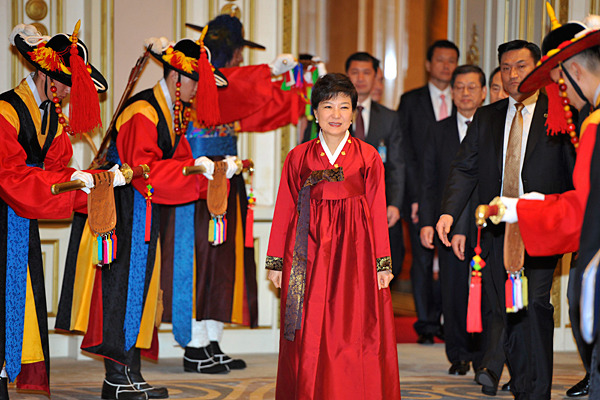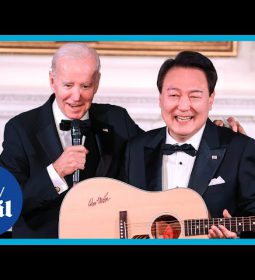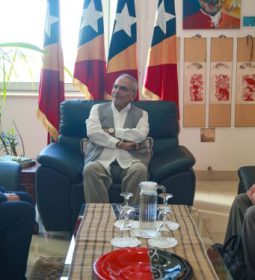South Korean President Park Seen Likely to Be Voted Out

SEOUL—Lawmakers grilled a former aide to President Park Geun-hye and several former officials on Wednesday over their alleged involvement in an influence-peddling scandal for which a Friday impeachment vote appears likely to strip the president’s powers.
That would mark a dramatic downfall for a leader who took office in 2013 pledging to break from earlier graft-tinged administrations. It would also add uncertainty for its U.S. ally as a new administration in Washington reconsiders its relationships in Asia, especially with China.
Ms. Park’s support for a U.S.-built missile-defense system to protect against North Korea has antagonized Beijing. Opposition politicians who seek Ms. Park’s ouster are calling for South Korea to scrap its deployment in favor of a more accommodating approach toward Beijing.
Ms. Park’s downfall would also complicate life for South Korea’s sprawling conglomerates, whose alleged involvement in the scandal has led to fresh calls to curb their power.
Lawmakers on Tuesday pressed the conglomerate’s heads over their links to Choi Soon-sil, a confidante of Ms. Parkwho stands accused of using her presidential ties to shake down the country’s biggest business groups for donations. Then, on Wednesday, lawmakers confronted other figures prosecutors implicated in the scandal, including a former Park aide and other Choi associates.
Ms. Choi, who was summoned to the Wednesday hearing, didn’t attend, citing a panic disorder, said lawmakers. Other former top Park aides stayed away as well.
Prosecutors say Ms. Choi used aides from the presidential Blue House to squeeze the conglomerates, known as chaebols, including the Samsung, Hyundai and LG business groups, for donations to two foundations she allegedly controlled. Prosecutors say Ms. Park helped Ms. Choi in the scheme. South Korean law insulates the president from prosecution while in office.
Ms. Park and Ms. Choi have denied the allegations, but the scandal has dragged Ms. Park’s approval ratings to historic lows and driven millions of demonstrators into the streets of Seoul calling for her ouster over the past six weeks.
In a sign of her diminished political standing, Ms. Park has stopped holding regular meetings with her cabinet in recent weeks, speaking publicly only three times—in each instance, to offer brief public remarks on the scandal.
HOW IMPEACHMENT WORKS
South Korean President Park Geun-hye faces an impeachment vote on Friday
- To be passed, two thirds of the 300-member National Assembly must vote to impeach Ms. Park.
- If impeached, Ms. Park would hand power to the prime minister, who would become acting president.
- The National Assembly’s 171 opposition party and independent lawmakers are expected to vote for impeachment. Local media reports say more than 29 members of Ms. Park’s ruling party are set to join them.
- If impeached, South Korea’s nine-member Constitutional Court would then have 180 days to rule on the validity of the vote
- If six of the nine members of the Constitutional Court assent, a new election would be required within 60 days.
- Otherwise, the National Assembly’s vote would be overturned and Ms. Park would be reinstated as president.
Ms. Park on Tuesday said she was willing to resign as soon as April, ruling-party leaders who met with her said. Opposition lawmakers rejected the offer, calling it a ploy to forestall impeachment proceedings, and reaffirmed their determination to push ahead with the vote on Friday.
If two-thirds of the 300-member National Assembly votes to impeach Ms. Park, she would immediately hand over power to the prime minister, traditionally a ceremonial position.
The odds of impeachment now look increasingly likely, analysts say. The National Assembly’s 171 opposition and independent lawmakers are all expected to vote for impeachment. Analysts expect them to be joined by at least 29 members of Ms. Park’s ruling party after its leaders said that they would allow members of their caucus to vote their conscience in the secret ballot.
“Even pro-Park lawmakers in the governing partycan’t defy the wishes of the people,” said Lee Nae-young, a political-science professor at Korea University in Seoul, who predicted impeachment. “They see that if the impeachment bill is voted down, the ruling party will suffer an even bigger political blow.”
An impeachment would leave Ms. Park in limbo, not able to exercise her executive powers but not losing her title, until the country’s nine-member Constitutional Court rules on the validity of the impeachment vote, said Lee Jong-soo, a professor of constitutional law at Yonsei University in Seoul. The court has 180 days to decide, but Mr. Lee said it was likely to decide within days or weeks.
If six members of the Constitutional Court assent, Ms. Park would be forced to step down and a new election would be required within 60 days. If six members fail to assent, then the National Assembly’s vote would be overturned and Ms. Park would be reinstated as president.
During the latest impeachment crisis in 2004, the Constitutional Court overturned the National Assembly’s vote against then-President Roh Moo-hyun. In that case, analysts say, the impeachment over a relatively minor technicality was met with anger by a public that sympathized with Mr. Roh.
This time around, Ms. Park’s near-universal unpopularity would likely put pressure on the court to assent to the legislature’s vote, said Scott Seaman, a Washington-based analyst for Eurasia Group.
But the Constitutional Court’s deliberations are complicated by the impending retirements of two judges in January and March, respectively. It is unclear whether those vacancies could be filled by Ms. Park or an acting president. Most legal scholars believe the acting president should hold off on naming any new judges, Mr. Lee, the professor, said.
—Min Sun Lee
contributed to this article.
Write to Jonathan Cheng at jonathan.cheng@wsj.com and Kwanwoo Jun at kwanwoo.jun@wsj.com
http://www.wsj.com/articles/south-korean-vote-seen-likely-to-oust-leader-1481105260
- Previous China’s Banks Are Hiding More Than $2 Trillion in Loans
- Next Mongolian pop singer becomes UNICEF special envoy
















